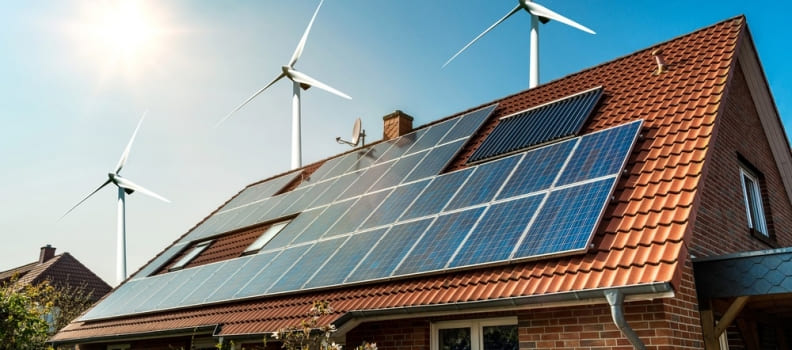
Would you like to invest in renewable energy in your home, but you are afraid of facing a long installation process or you think that the investment will not be profitable? Last October, the Government published a new regulation on self-consumption of electricity that paves the way for citizens to achieve more sustainable homes.
We give you the keys that this new regulation brings with it .
Self-consumption of electricity in Spain
Before going into the regulation in depth, it is worth clarifying that, in Spain, you can access electricity in two ways : obtaining it from the private entity Red Eléctrica de España , as most of the population does, or by supplying yourself through your own production systems , such as solar panels or wind generators.
This second option is gradually gaining ground. In fact, according to the latest report from Red Eléctrica de España , in 2018, renewable energies accounted for 40% of total electricity demand, 6.3 percentage points more than in 2017.
And with the approval, in October 2018, of Royal Decree-Law 15/2018, on urgent measures for the energy transition and consumer protection , which regulates the technical and administrative conditions of electrical self-consumption, in our country, the use of 'green' energies in homes is increasingly being promoted. Its objective, as explained in the explanatory statement of the law, is "decarbonisation, decentralisation of generation, electrification of the economy, more active participation of consumers and a more sustainable use of resources".
Keys to the new regulations on self-consumption of electricity
Where does the legislative improvement of self-consumption of electricity lie? The Royal Decree incorporates a series of new features that favour the use of renewable energies in homes. These are the main keys to the regulation:
- Elimination of the 'sun tax' . Under the previous legislation, if you were a self-consumer of energy, you had to pay a fee to use Red Eléctrica as a backup source - in case you needed extra energy. This tax, known as the sun tax, is eliminated with the new regulation. Specifically, article 9.5 of the decree establishes that "self-consumed energy from renewable sources, cogeneration or waste will be exempt from all types of charges and tolls."
- Compensation for surpluses. Current legislation also divides self-consumption into two models: those that do not feed energy into the grid (i.e. you consume all the energy you generate yourself) and those that do. In this second case, the law provides that these self-consumers - provided that the total power of the installations does not exceed 100 kW - receive compensation for the surpluses they deposit in the general circuit through the net balance system. Thus, by sharing your electricity on the grid for free, you can also use the energy from the system in the same proportion without having to pay for it, so the bill can be reduced.
- Shared self-consumption . Until now, you could install photovoltaic panels in your villa for self-supply, but you could not do the same as part of a community of neighbours, as shared self-consumption was prohibited. The new regulation, on the other hand, expands the concept of electrical self-consumption, introducing shared self-consumption between several homes. In this way, the owners of the same building can now install solar panels in the common elements of the block and benefit from them. In addition, the installation does not have to be in the same building, but can be located in the vicinity and on lines derived from the same transformer.
- No power limitation. Another novelty of the decree is that it eliminates the requirement that the power of the installations has to be less than the power of consumption, which meant that, in the end, you would need back-up electricity from the grid. At the same time, it repeals the tax on batteries, with which you can 'store' your own surplus and cover 100% of your daily electricity consumption.
- Bureaucratic simplicity . With the new regulations on self-consumption of electricity, bureaucratic procedures are considerably simplified, leading to significant savings in time and money, since by streamlining the paperwork, the costs of certificates and approved measurement and verification systems are reduced. Specifically, production facilities with a power of no more than 100 kW for self-consumption with surplus do not have to be registered in the administrative register, while those that are not going to feed energy into the grid do not have to ask the electricity company for permission to connect.
In general terms, this new regulation represents a great improvement for self-consumption of electricity. In fact, according to the Organization of Consumers and Users , the decree will make it possible for the installation of a single photovoltaic panel in a home to be profitable, saving between 80 and 100 euros per year on the electricity bill of any household.
